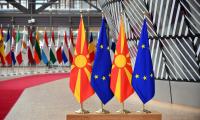The EU as a tool for democratic development
The world is currently experiencing an authoritarian wave, with numerous countries caught in the crossfire between democracy and dictatorship. Countries in the Western Balkans are torn between the Russian dictatorship and the ambition for EU membership and a seat at the democratic table.

In many parts of the world, the lines between democracy and autocracy are becoming more and more distinct. For an increasing number of countries, EU membership is a way to secure a powerful ally in the maintenance and development of their democracy.
In the Western Balkans, several countries have long strived to join the European democratic community, as Russia is standing on the other side, ready to draw in the opposite direction.
It is critical for these countries to gain access to the curving buildings of Brussels so that the EU can support a more secure and democratic future for their countries.
Green Left in partnership with a green North Macedonian party

The Danish party, Green Left has initiated a partnership with the North Macedonia’s Green party, The Democratic Renewal of Macedonia (DOM) advocating for the country's green transformation. The partnership between the Green Left and DOM aims to create a more inclusive party with more space for women and young people, as well as a more democratic future.
DIPD spoke with Maja Morachanin, the leader of the party and its only member of parliament on her visit to Denmark earlier this year in connection with a conference that Green Left helped organise. She underlined her country's strong desire to join the EU community and how it will benefit her country's future democratic development:
“For us, the EU accession process is not an empty phrase. No, we want to tackle corruption and organised crime and to be held accountable for human rights, the rule of law, and environmental issues. EU accession has essential transformative power. It will strengthen our capacities to speed up the needed reforms in the Western Balkan countries”, Morachanin says.
EU-negotiations leading to conflict negotiations
North Macedonia submitted its application to become part of the EU back in 2004 and was granted the status of an EU candidate country in December 2005. Since then, several bilateral issues between EU nations and North Macedonia have put a halt to the process.
First, there was the name dispute with Greece. Greece would not accept the name of the country, as Macedonia also refers to a Greek region. But with the Prespa Agreement with Greece, in 2018, which included a name change for this Western Balkan country, North Macedonia thought that progress in the accession process would be accomplished.
After ending the name dispute, North Macedonia became a member of NATO, but its EU membership was still in limbo.
Identity as a high political issue
However, another constitutional amendment is required if the country is to join the EU. Bulgaria has opposed the negotiation process due to differences in the two countries' identities and histories, and Bulgaria demands that the constitution of North Macedonia include the Bulgarian minority.
At the same time, Bulgaria does not recognise the Macedonian language, and considers it a dialect of the Bulgarian language:
“The Macedonian language and identity are of great importance for the Macedonians. The Prespa Agreement with Greece was to contain the Macedonian language and to keep the Macedonian identity. However, the new demands from Bulgaria are undermining this identity”, Morachanin says, continuing:
“The North Macedonian society is a multi-cultural and multi-ethnic society; it is united in diversity. Six minorities have already been introduced into the Constitution. Therefore, having other ethnic minorities in the Constitution is not a problem, per se. What makes the citizens bitter and humiliated is that Bulgaria does not recognise the Macedonian language and that instead of being focused on fulfilling the Copenhagen criteria, the EU accession process is polluted by bilateral identity and historic issues. Also, many citizens do not believe that the introduction of the Bulgarian minority into the Constitution will indeed be the last veto.”
Support for the EU is declining
According to Morachanin, this has a negative impact on the population's trust in the EU:
“What we could see during this period was that the great support for joining the EU has decreased from being 85% of the population to around 72%. It is still high, but after 17 years of candidate member status, disappointed by the setting of new conditions, this time from Bulgaria, the citizens lose motivation, dedication, and trust in the EU accession process," Morachanin says.
Morachanin believes that an EU membership means better opportunities to strengthen and support her country's democratic development:
“We have seen that other countries have made significant progress, driven by the goal to meet the EU standards and become an EU member state. We need EU support to make these positive changes in North Macedonia, too. The enlargement process is a benefit for the EU, as well. The situation caused by Russia’s aggression against Ukraine confirms how crucial it is to cooperate, to act together in solidarity. The Western Balkans belong in the EU”.



